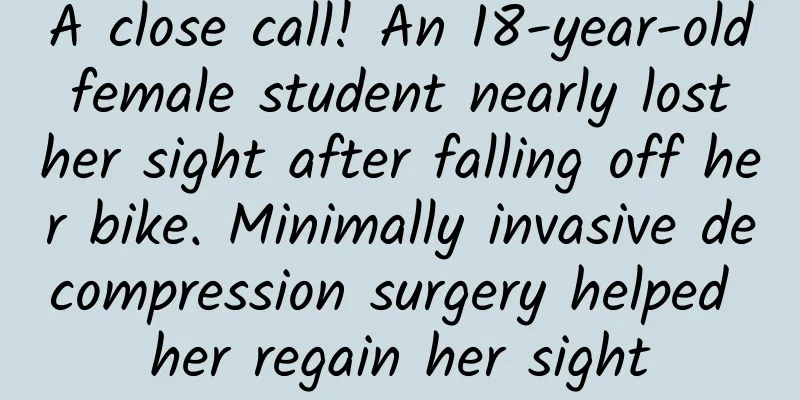A close call! An 18-year-old female student nearly lost her sight after falling off her bike. Minimally invasive decompression surgery helped her regain her sight

|
Xiaoyi, an 18-year-old female student from Changsha, fell while riding an electric bike, causing a head injury and complete loss of vision in her right eye. She was at risk of blindness. Fortunately, she underwent transnasal endoscopic optic nerve decompression surgery in the Department of Otolaryngology and Head and Neck Surgery III of Hunan Provincial People's Hospital and successfully saved her visual function. Half a month ago, Xiaoyi accidentally fell over while riding an electric bike, injuring her head and losing consciousness at the time. After regaining consciousness, she found that she had completely lost sight of her right eye, and everything in front of her was dark. Her family sent her to the emergency department of the Mawangdui Campus of Hunan Provincial People's Hospital and admitted her to the third ward of otolaryngology and head and neck surgery . After Xiaoyi was admitted to the hospital, the doctor found that his right pupil had dilated, his light reflex had disappeared, and his vision had lost its light perception. Further examination revealed that Xiaoyi had a fracture of the right optic canal, multiple fractures of the skull base with intracranial gas, subarachnoid hemorrhage, multiple fractures of the right zygomatic arch, the anterior and posterior outer wall of the right maxillary sinus, and the outer wall of the right orbit. Zhou Jianbo, chief physician of the third department of otolaryngology and head and neck surgery , said that traumatic optic nerve damage is an emergency and critical disease. If the fracture fragments of the optic canal are not cleaned in time and the compressed optic nerve is not relieved, Xiaoyi's right eye will be blind forever. Chief Physician Zhou Jianbo said that the optic canal protects the optic nerve under normal circumstances, which is equivalent to an outer protective shell. However, when the optic canal is fractured due to head trauma, especially injuries to the zygomatic arch and brow bone, the optic nerve inside will also be injured and swollen due to bone fragments. At this time, the outer protective layer of the optic canal becomes a "tightening curse", tightly encircling the optic nerve, making the damage more and more serious. Therefore, the first step is to decompress the optic nerve, remove the bony incarceration of the optic nerve, and relieve the swelling of the optic nerve so that the function of the optic nerve can be restored. Traditional optic canal decompression usually requires craniotomy, which is relatively traumatic, with a high risk of postoperative infection and poor postoperative efficacy. In recent years, with the development of endoscopic technology, nasal endoscopic optic canal decompression has become a new method for treating traumatic optic nerve injury. This surgical technique utilizes the natural cavity of the nasal cavity and sinuses, and has the advantages of direct path, less damage, sufficient decompression, and significant efficacy. Optic nerve decompression surgery is quite difficult. Xiaoyi has multiple fractures of the skull base, orbit, maxilla and zygomatic bone, accompanied by intracranial subarachnoid hemorrhage and intracranial gas. In addition, the fracture fragments are very closely related to the internal carotid artery, so the risk of "decompression" surgery is high. After full communication with the family and careful preparation for the operation, Chief Physician Zhou Jianbo's team performed transnasal endoscopic optic nerve decompression on Xiaoyi. The operation was successfully completed. On the first day after the operation, Xiaoyi's right eye regained light perception. On the fifth day, his naked eye vision recovered to 0.02, and his visual field also recovered to 80%. At present, Xiaoyi's right eye vision is close to the level before the injury, and he was discharged from the hospital smoothly on October 24. Chief Physician Zhou Jianbo reminds that after the optic nerve damage is confirmed, surgical treatment should be performed as soon as possible in a hospital with conditions, under the premise of ensuring the stability of vital signs. The earlier the surgery, the better the effect. Hunan Medical Chat Special Author: Wang Yuanyuan and Wang Juan, Department of Otolaryngology, Hunan Provincial People's Hospital Follow @湖南医聊 to get more health science information! (Edited by YT) |
>>: Don't dig your corns casually, be careful of infection! Diabetics should pay special attention
Recommend
Lower abdomen pain when sleeping at night
Women are not likely to catch a cold in their dai...
Why do my legs hurt during menstruation?
Some women will experience various symptoms when ...
Western medicine for polycystic ovary
In our lives, most women think that having polycy...
Can women pluck their beards?
Girls also grow beards, which is a manifestation ...
What to do if you have acne on your face in summer
It is normal to have acne. There are many reasons...
What causes girls' loose skin?
The condition of the skin determines our mental a...
What are cervical cells?
Cervical cells are cervical epithelial cells, whi...
40 days pregnant, stomach pain but no bleeding
If you have abdominal pain for 40 days during pre...
How do women detox? These are the best ways to detox and beautify your skin!
Detoxification and beauty care have become a hot ...
What are some tips to relieve dysmenorrhea?
Dysmenorrhea is something that many women experie...
How to do the postpartum anal lifting and vaginal tightening exercise
For mothers, childbirth will cause great harm to ...
How many days does it take for a baby to grow after weaning?
The question I want to discuss with you today is ...
Treatment of cervical acetic acid white epithelium
Many female friends are prone to symptoms of cerv...
What causes excessive vaginal discharge?
If there is a lot of secretion, women need to pay...
What are some beauty tips in daily life?
Today is a high-tech society, the operation of va...









